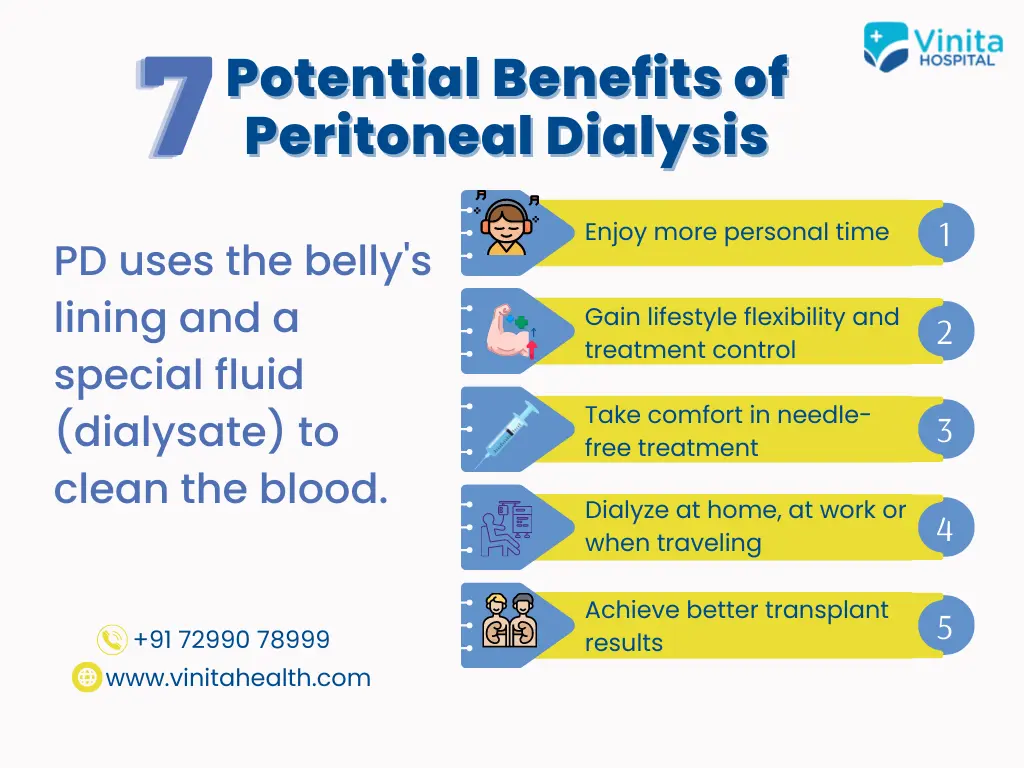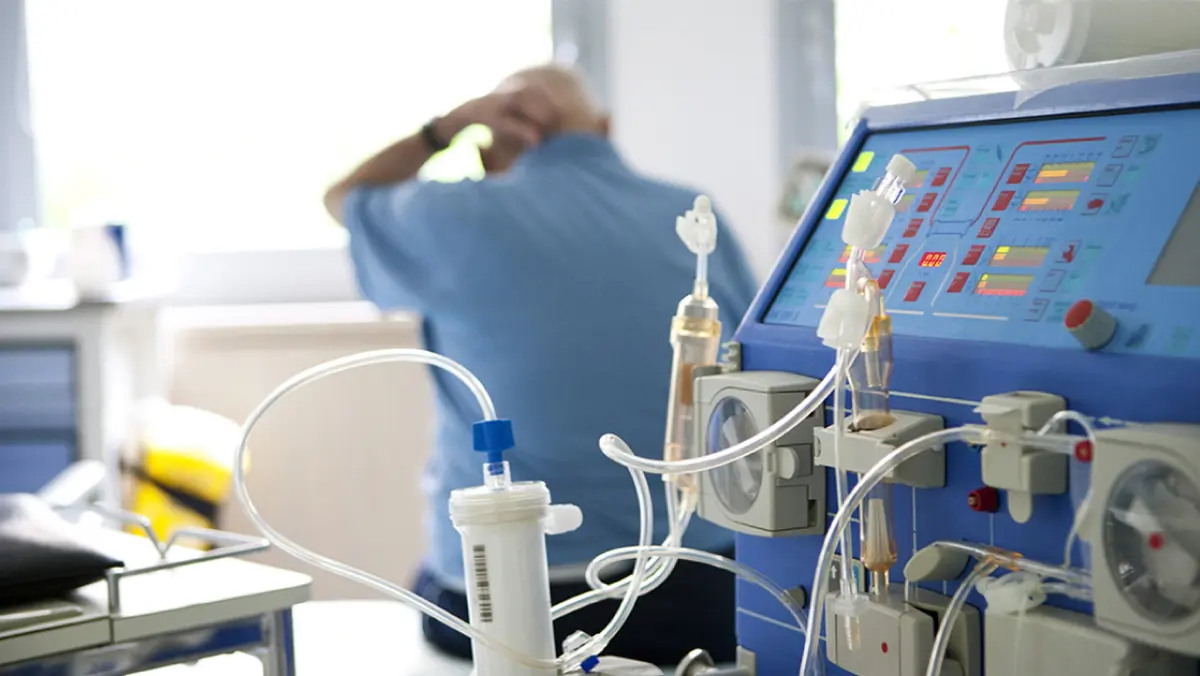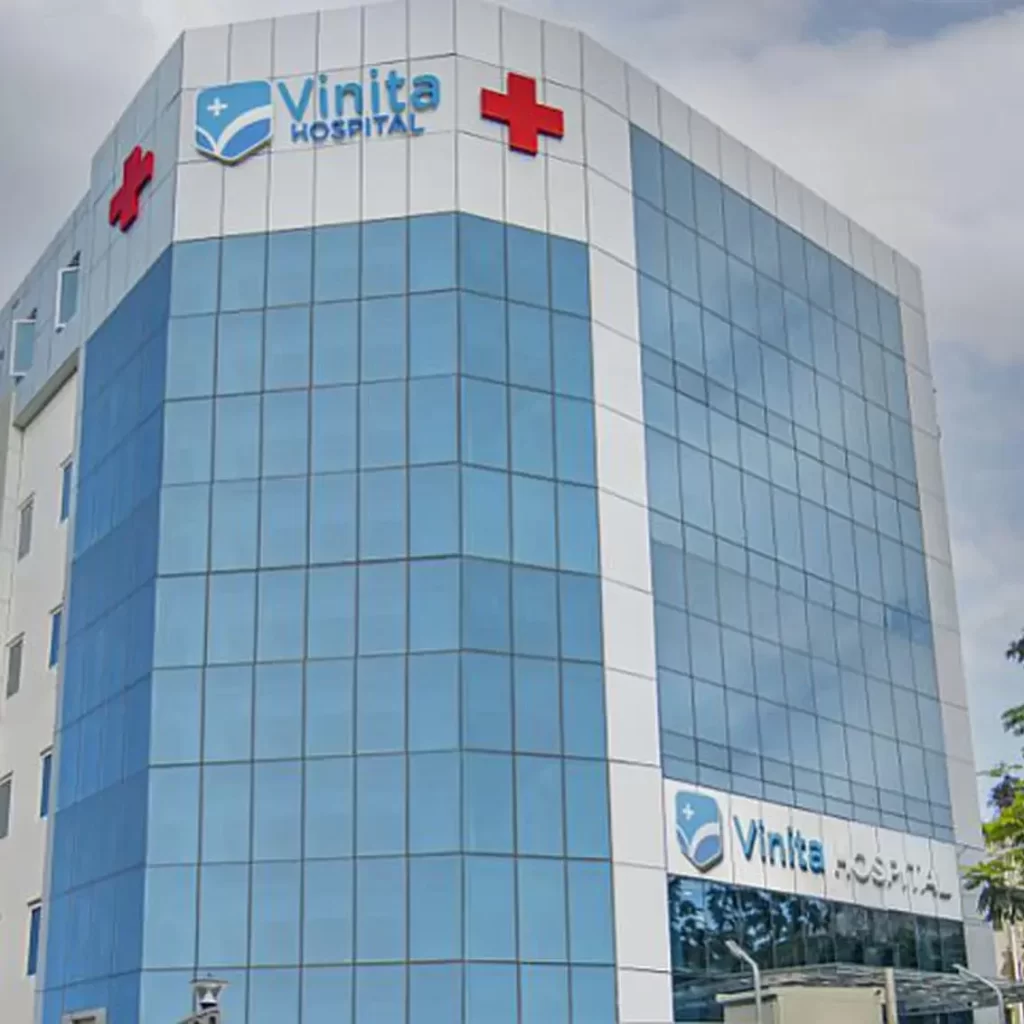The dialysis unit at the Vinita Hospital offers the most comprehensive medical care for patients suffering from acute renal failure and end-stage renal disease. Our experienced and well-qualified specialists from this best dialysis hospital in Chennai work closely with colleagues in the internal medicine department, ICU, surgery, and radiology department to offer unique services for the well-being of society.
A dedicated and multidisciplinary team consisting of highly trained dialysis technicians, nephrologists, dieticians, and nursing staff is employed to ensure optimal outcomes for dialysis patients. The ambulatory and hospitalized patients suffering from kidney-related issues, such as chronic kidney failure, are treated in this best hospital for dialysis in Chennai with extensive individualized care and attention.
The healthcare provider will check your condition and review dialysis options at an affordable dialysis cost in Chennai that best suits your needs.
What is Dialysis?
Dialysis is indicated when a patient develops end-stage renal disease or kidney failure. It is a life-support treatment for patients with renal failure. In kidney failure, the kidneys will be unable to filter the blood and clear the uremic toxins (waste products such as urea, creatinine, and acids). Dialysis aids your body to stay in balance by:
1. Clearing or removing waste products, toxins, salt & excess water from the body.
2. Maintaining the balance of chemicals like sodium, potassium, and bicarbonate.
3. Keeping blood pressure in control.

Who Needs Dialysis?
People who are prone to kidney failure, or end-stage renal disease may be in need of dialysis. Injuries or conditions like diabetes high blood pressure and lupus can damage kidneys, leading to kidney disorders. Kidney failure can be a long-term condition, or it can emerge suddenly (acute) after a severe injury or illness. This type of kidney failure will go away as you recover.
There are five stages of kidney disease where appropriate treatment has to be given in the best dialysis hospital in Chennai for the stages of the disease. But when a patient is in end-stage renal disease or kidney failure, dialysis or a kidney transplant is required to stay alive. Some people undergo dialysis while waiting for a kidney transplant.
Best Hospital for Dialysis in Chennai
Vinita Hospital
Vinita Hospital in Chennai is renowned for its exceptional dialysis services, providing top-quality care and advanced treatments for patients with kidney-related issues. Known for its patient-centric approach, Vinita Hospital ensures that every patient receives personalized and compassionate care during their dialysis sessions.
- Cutting-edge dialysis units featuring the latest technology.
- Experienced nephrologists and nursing staff ensuring the highest standards of care.
- Comfortable and hygienic environment for patients undergoing treatment.
- Comprehensive patient education and support programs.
- Flexible scheduling to accommodate patients’ needs.
Vinita Hospital stands as the best hospital for dialysis in Chennai, dedicated to enhancing the quality of life for its patients through exceptional medical care.
Types of Dialysis
There are two types of dialysis that include hemodialysis and peritoneal dialysis.
Hemodialysis
It is a type of dialysis where the best dialysis hospital in Chennai uses an artificial kidney (hemodialyzer) to help remove toxins, electrolytes like potassium, carbonate, and excessive fluid from the human body. For this, the doctor will do a small surgery on a patient’s leg or arm to get access to the blood vessels.
Sometimes, the access is made by joining an artery to a vein that is under the skin called the AV fistula. If the fistula is not made, the experts in the dialysis hospital in Chennai will use a plastic tube to complete the process known as the AV graft. A patient has to spend about 3 to 4 hours (at least twice a week), undergoing dialysis, during which they can read, use a laptop, watch television, talk to others, etc.
- Before hemodialysis, a patient may need to have a blood test to check their electrolyte levels, blood count, and other vital parameters. The patient’s blood pressure and weight are also checked to determine how much fluid should be removed during the dialysis treatment. The patient is then connected to the hemodialysis machine, which uses a filter called a dialyzer to remove waste products and excess fluid from the blood.
- During hemodialysis, the patient’s blood is drawn from their body through a needle inserted into their arm, which is then connected to the dialyzer. The blood passes through the dialyzer, where it is filtered to remove waste products and excess fluids. The clean blood is then returned to the patient’s body through another needle in the other arm. Hemodialysis which is performed at the dialysis hospital in Chennai usually lasts three to four hours, and the patient is monitored throughout the procedure to ensure their safety.
- After hemodialysis, the patient’s vital signs are checked, and their weight is measured again to ensure that the proper amount of fluid was removed during the treatment. The patient may feel tired or dizzy after the procedure, and it is important to rest and drink plenty of fluids to avoid dehydration. The patient’s doctor may also adjust their medications or diet to ensure that they maintain a healthy balance of electrolytes and other vital nutrients. In some cases, patients may need to undergo hemodialysis multiple times per week, depending on their condition and treatment plan.
Peritoneal Dialysis
This type of dialysis is performed in the dialysis hospital in Chennai where a patient’s blood gets cleaned using a specialized fluid by keeping it inside the abdominal cavity. Here the doctor performs surgery to insert a plastic tube or catheter into the patient’s belly and makes the abdominal area gets filled with dialysate fluid.
Then excess fluid and wastes are extracted from the blood into the dialysate by filtration, diffusion, and convection gradients. It completely differs from hemodialysis in the process of filtering the blood.
- Before peritoneal dialysis, the patient undergoes a surgical procedure to have a catheter inserted into their abdomen. This catheter serves as a pathway for the dialysis solution to enter and exit the patient’s body during the procedure. Before the first treatment, the catheter site is cleaned and sterile dressings are applied. The patient’s vital signs and weight are also checked to determine the appropriate amount of dialysis solution.
- During peritoneal dialysis, in the best dialysis hospital in Chennai, the patient first drains the old dialysis solution from their abdomen using the catheter. They then fill their abdomen with fresh dialysis solution, which helps remove waste and extra fluid from the body. The solution stays in the abdomen for several hours, during which time the patient can go about their usual activities. The solution is then drained from the abdomen and discarded, and the process is repeated several times a day or overnight, depending on the patient’s prescribed treatment plan.
- After peritoneal dialysis, the catheter site is cleaned and dressed with sterile bandages. The patient’s vital signs and weight are checked in the dialysis hospital in Chennai to ensure that the treatment was effective in removing enough waste and fluid from the body. The patient may experience some discomfort or bloating after the procedure, but this usually subsides within a few hours.
It is important for patients to follow a prescribed diet and fluid intake regimen to maintain proper electrolyte balance and avoid complications. The patient’s doctor may also adjust their medications or dialysis solution as needed to ensure the best possible outcomes.
Facilities Available
The facilities provided in the best dialysis hospital in Chennai are among the most sophisticated with modern technology in the region offering state-of-the-art therapeutic equipment, pleasant accommodations, and other useful personal amenities at a reasonable dialysis cost in Chennai.

Vascular Access
- AV Fistula
- AV Graft
- Long-Term Dialysis Catheter Insertion
- Temporary Dialysis Catheter Insertion
- Femoral Catheterization
Dialysis Modalities
- Haemodialysis
- SCUF
- SLED
- CAPD
- High Flux Dialysis
- CRRT
- ADP
Special Therapies / Investigation
- Plasmapheresis
- DTPA Scan
- DRCG Scan
- DMSA Scan
- Kidney Biopsy
- Vascular Mapping & Angiography
Kidney Transplant
- Cadaver Renal Transplant
- Living Donor Kidney Transplant
- ABOi Kidney Transplant
- OPD & IPD treatment of all kidney diseases
Why Vinita Hospital?
Vinita Hospital stands out as the premier dialysis center in Chennai as it is equipped with a state-of-the-art dialysis unit to deliver exceptional care to patients. Our dedication to meticulous planning and execution is evidenced by the development of thorough infection control protocols and top-notch facilities.
- Our Chennai-based dialysis center is equipped with the latest machines, which include cardiac monitors and all basic facilities.
- Our dialysis department is located adjacent to the medical ICU for easy access and monitoring of patients.
- We have a separate facility and dialysis machine specifically for HBsAg patients.
- Bedside dialysis facilities are available in our ICU for added convenience.
- We prioritize aseptic care in our unit, providing affordable dialysis cost in Chennai.
- Our dialysis procedures utilize femoral, jugular, and subclavian haemodialysis catheterization, AV fistula, and permcath techniques.
- We have experienced physicians, staff, and well-trained dialysis technicians who supervise our patients.
- Our dialysis department is fully air-conditioned and is also equipped with modern amenities such as TVs, to make sure patients get extreme comfort during the treatment.
- Moreover, the highly trained paramedical staff are equipped in this best dialysis hospital in Chennai.
What are the risks and complications associated with dialysis?
While dialysis is a life-saving treatment for individuals with kidney failure, it is not without risks and complications. Some of the potential risks and complications associated with dialysis include:
1. Infection: Dialysis access sites, such as catheters or fistulas, can become infected, leading to localized or systemic infections.
2. Low Blood Pressure: During dialysis, a drop in blood pressure can occur, causing dizziness, nausea, and even fainting. This is known as hypotension.
3. Muscle Cramps: Some patients experience muscle cramps, especially in the lower extremities, during or after dialysis sessions.
4. Fluid Overload: Inadequate fluid removal during dialysis can result in fluid overload, leading to edema, shortness of breath, and hypertension.
5. Anemia: Dialysis can contribute to anemia due to decreased production of red blood cells or loss of blood during the procedure.
6. Electrolyte Imbalances: Dialysis can affect the balance of electrolytes in the body, potentially leading to complications such as hyperkalemia or hypokalemia.
7. Amyloidosis: Long-term dialysis can cause the buildup of proteins called amyloids, leading to joint pain, stiffness, and other complications.
It is important for individuals undergoing dialysis to closely monitor their health, adhere to prescribed medications and dietary restrictions, and promptly report any symptoms or concerns to their healthcare provider. Regular follow-up and communication with the healthcare team can help minimize the risks and complications associated with dialysis.
Who are the best doctors for Dialysis?
The field of nephrology specializes in the diagnosis and treatment of kidney diseases, including dialysis. When seeking the best doctors for dialysis, it is important to look for experienced nephrologists who have expertise in managing dialysis patients. Here are a few criteria to consider when identifying the best doctors for dialysis:
1. Board Certification: Look for nephrologists who are board-certified or have received specialized training in nephrology.
2. Experience: Consider doctors who have significant experience in the field, particularly in managing dialysis patients and addressing complications associated with the treatment.
3. Reputation and Patient Reviews: Research the reputation of nephrologists through patient reviews, testimonials, or referrals from trusted sources.
4. Hospital Affiliations: Doctors associated with renowned hospitals or dialysis centers may provide high-quality care.
5. Collaboration and Communication: Look for doctors who communicate effectively, listen to patient concerns, and collaborate with other healthcare professionals involved in the patient’s care.
Ultimately, the best doctor for dialysis will depend on individual preferences, location, and specific medical needs. Consulting with primary care physicians or seeking recommendations from healthcare providers at the dialysis hospital in Chennai can help identify suitable nephrologists in your area.
Conclusion
Dialysis is a lifesaving treatment for patients with end-stage renal disease or kidney failure. There are different types of dialysis where some people prefer to do it at home, while others go to the hospital or dialysis centre.
To get advanced medical treatment with a team of highly trained nephrologists, you can approach Vinita Hospital because the primary goal of this dialysis hospital in Chennai is to provide world-class clinical care with the best research and cost-effective treatment.
Read also Best urology hospital in Chennai.



